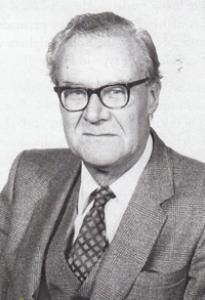
Frank Parsons was one of the pioneers of haemodialysis, his work leading to Leeds becoming in 1956 the first centre in the UK to use haemodialysis for acute renal failure.
Parsons qualified from Leeds University Medical School in 1943 and after National Service began to train in surgery, becoming a urology registrar under Leslie Pyrah at Leeds General Infirmary (LGI). Pyrah (the first UK holder of a Chair in Urology), arranged for Parsons to visit the United States in 1954, during which he spent three months at Peter Bent Brigham Hospital, Boston under John Merrill where he learnt all he could about the use of the Kolff drum-coil artificial kidney. Towards the end of that visit, Parsons began to supervise dialysis sessions alone. The first patient he dialysed was a young man receiving his first dialysis, who proved to have irreversible renal failure and in due course became the recipient of the first successful kidney transplant in the world (from his identical twin brother as donor).
He returned to Leeds determined to start using acute dialysis, and Pyrah was influential in convincing the LGI trustees to buy a Kolff-Brigham machine and meet the costs of the first cases to be treated. Parsons proved adept at the practical tinkering needed to pioneer the dialysis technique and adopted a rigorous approach to fluid and electrolyte balance taking advantage of the only flame photometer at that time available in Yorkshire. The Artificial Kidney Unit opened at LGI in 1956, but there was little enthusiasm from the medical establishment in England. Pyrah arranged a visit by the Medical Research Council (MRC) during which Sir Harold Himsworth, the Secretary of the MRC, famously said: “Try it, Parsons, but remember... the country is against you”.
Parsons soon built up a wide experience, publishing a series of some 70 cases of acute renal failure, with results that gave conclusive evidence of the value of dialysis. By the end of the 1950s, another half dozen units offering acute dialysis had been established in the UK.
Frank Parsons was not a fully trained physician and was appointed by LGI in due course as Consultant in Clinical Renal Physiology. Other aspects of the medical care of the patients he dialysed were undertaken by the medical professorial unit, until Leeds appointed its first nephrologist, Stanley Rosen, in the mid-1960’s.
Parsons understood the importance of collecting observational data in registries. His continuing registry of the Leeds cases enabled valuable later publications comparing the outcome of dialysed acute renal failure in different eras. He was also co-founder with William Drukker (of Amsterdam) of the EDTA Registry of renal replacement therapy in Europe.
He was co-editor of the first two editions of The Replacement of Renal Function by Dialysis, which became internationally the standard text.
Once regular haemodialysis for irreversible renal failure became an established therapy, he was an energetic president of the LGI Kidney Patients Association, and in 1986 he received the first Ruth Lupton award of the National Federation of Kidney Patients Associations.